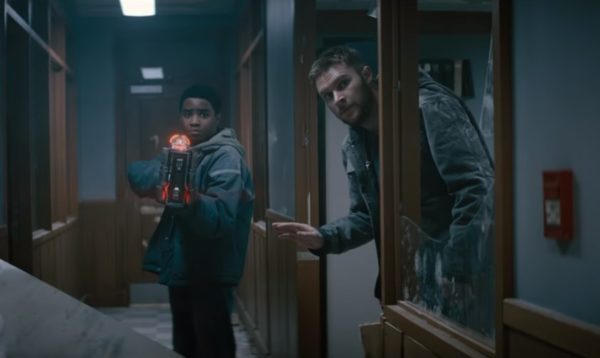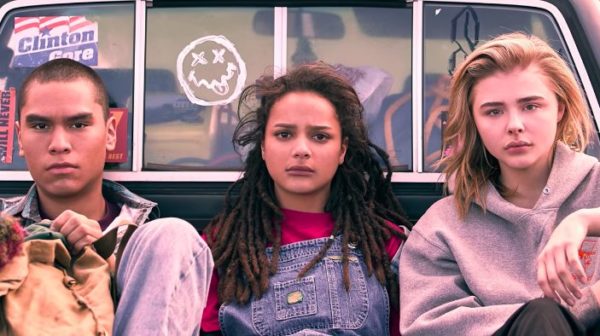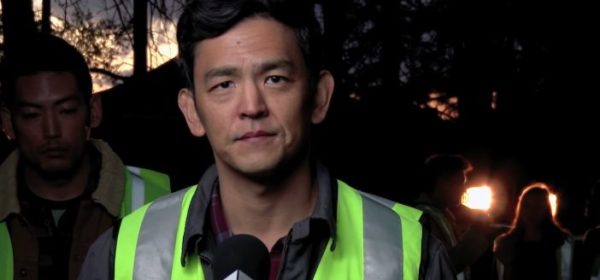[yasr_overall_rating]
Films about surviving the wilderness alone are as frequent as the reality TV shows that follow the same premise. Alejando G. Inarritu's The Revenant combines this well-worn theme with one that's even more worn out – revenge – but in such a visceral way that it is like there has never been a film like it before.
Based on Michael Punke's novel The Revenant: A Novel of Revenge, the film is based on the true story of Hugh Glass, played by Leonardo DiCaprio. The frontiersman and fur trapper is a member of a party moving through Montana and South Dakota in 1823. In addition to his young, half-Native American son Hawk (Forrest Goodluck), the team also includes Captain Andrew Henry (Domhnall Gleeson), the selfish John Fitzgerald (Tom Hardy) and Jim Bridger (Will Poulter).
Glass gets separated from the main team and is brutally attacked by a bear, leaving him fatally injured. Most of the group doesn't want to leave him behind, but Fitzgerald sees Glass as a liability, especially with Native Americans on their trail. Henry agrees to leave Glass with his son, Jim and Fitzgerald. The moment Fitzgerald sees a chance to leave Glass behind, he takes it and kills Hawk. This forces Glass to survive on his own and he hopes to take revenge on Fitzgerald, no matter the cost.
The Revenant's main selling point is the chance to see DiCaprio put his body through countless trials and difficulties, from getting mauled by the bear to sleeping inside a horse's corpse. Yes, DiCaprio's performance is even thrilling to see, as he proves he's an A-Lister ready to get so dirty that he finally wins an Oscar. However, since the story of revenge is not just one-sided, Glass' fight for survival is only one piece of the puzzle. Inarritu, coming off the technical marvel of Birdman, is too smart to allow his 156-minute epic to rest on the shoulders of one sequence.
The supporting cast is the unsung group of heroes of the film. Domhnall Gleeson is clearly intent on proving himself more than just a character actor. Will Poulter makes you wish that the movie was more focused on his journey with Fitzgerald than Glass' survival. And Tom Hardy is the perfect foil for DiCaprio. Yes, DiCaprio might have to do more crazy things to survive, but Hardy's performance as the villainous Fitzgerald makes the character far more interesting. He might not be the film's focus and his dialogue is often barely understandable, but it sounds like Fitzgerald had a more intriguing life than Glass.
One angle of The Revenant that can get easily lost is the relationship between settlers and the Native Americans. While we watch the race between Fitzgerald and Glass unfold, Inarritu and co-writer Mark L. Smith are also taking us on the hunting trail with the Arikara, a Native American tribe searching for one of their kidnapped women. This search makes Glass' story feel almost insignificant, compared to the troubles of people who have been on this land for centuries. Another filmmaker might have ignored this angle, or just let it get lost halfway through the film. But Inarritu, who has famously juggled multiple narratives at once in his other works, does not. He follows this all the way to the end.
Inarritu's films are often technically polished, and The Revenant is no exception. With its stunning cinematography and fluid camera by Emmanuel Lubezki, this is not a movie to see on a small screen. The director certainly wouldn't be friends with some of the classical filmmakers, who tried to make audiences less aware of cameras, because Lubezki's camera is as much a character as the people on screen. It often wonders where to focus its attention and is frequently covered by blood, saliva and snow.
The director has also found an incredible group of composers to work with. The score by Ryuchi Sakamoto, Alva Noto and Bryce Dessner ebbs and flows, highlighting the dramatic points well. It follows the film like the ghosts of Glass' past and directs our attention as much as the camera does.
The Revenant is a test of endurance for all involved in front of the camera, behind it and all of us sitting in the audience. But it doesn't lumber to its dramatic conclusion, which features the best choreographed fight in years. Inarritu and his team created a completely engaging, multi-layered work that is not resting only on the shoulders of DiCaprio's performance. The graphic detail might be too much for some, but anything less would be a betrayal from the filmmakers.



